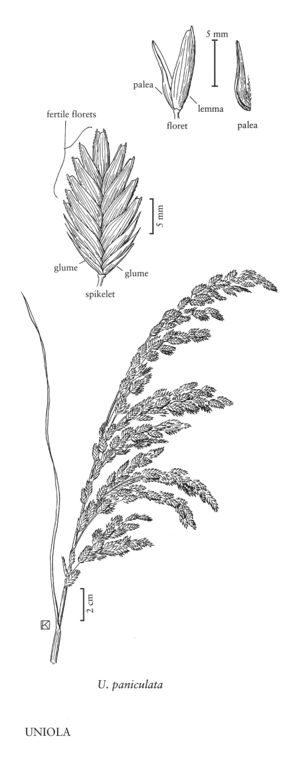Difference between revisions of "Uniola paniculata"
imported>Volume Importer |
imported>Volume Importer |
||
| Line 39: | Line 39: | ||
|publication year= | |publication year= | ||
|special status= | |special status= | ||
| − | |source xml=https://bitbucket.org/aafc-mbb/fna-data-curation/src/ | + | |source xml=https://bitbucket.org/aafc-mbb/fna-data-curation/src/200273ad09963decb8fc72550212de541d86569d/coarse_grained_fna_xml/V25/V25_31.xml |
|subfamily=Poaceae subfam. Chloridoideae | |subfamily=Poaceae subfam. Chloridoideae | ||
|tribe=Poaceae tribe Cynodonteae | |tribe=Poaceae tribe Cynodonteae | ||
Latest revision as of 18:58, 11 May 2021
Plants perennial; rhizomatous. Culms to 2.5 m. Sheaths glabrate, mostly glabrous at maturity, with tufts of hairs near the collar; collars ciliate to pubescent; blades to 67 cm long, about 1 cm wide. Panicles 27-67 cm, open; branches drooping or nodding at maturity. Spikelets 15-30(50) mm long, 6-16 mm wide, ovate-elliptical, with (3)5-34 florets, the lower (3)4-5(8) sterile. Glumes 5-12 mm, acute; lemmas essentially glabrous, (7)9(13)-veined; paleas present only in the functional florets; anthers 4-6 mm. Caryopses 3-5 mm long, 1-1.5 mm wide. 2n = 40.
Distribution
Md., Miss., Tex., La., Del., Ala., N.C., S.C., Va., Ga., Fla.
Discussion
Uniola paniculata grows on the beaches and sand dunes of the Atlantic and Gulf coastal plains from Maryland to Veracruz, Mexico, and on the Florida Keys, the Bahama Islands, and Cuba. Seed production is generally poor; the reason is not known.
Selected References
None.
